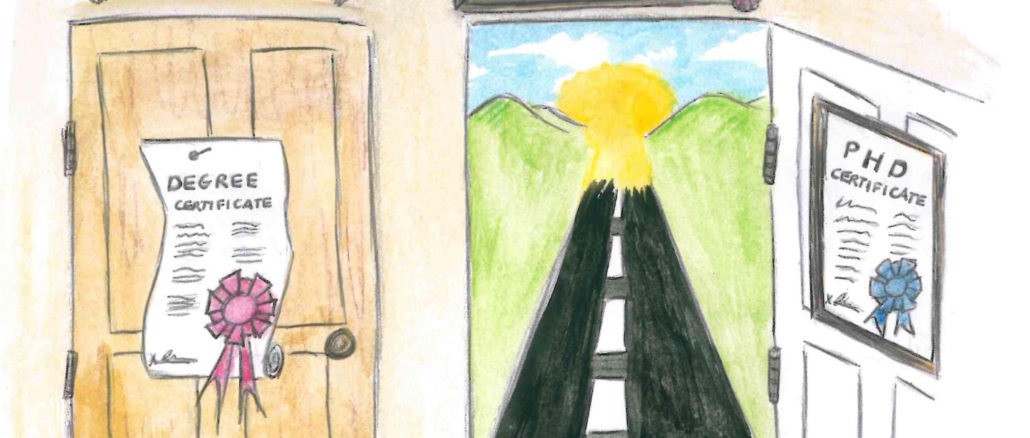
[dropcap]On[/dropcap] the ninth of March 2016, an applied psychology master’s degree student called Elaine rang up Liveline to talk to Joe Duffy. During their conversation, the twenty-three-year-old student informed Joe that she was nearing the end of her course and in the process of looking for work as an assistant psychologist (AP).
In order to have a better chance of getting a place on a clinical psychology doctorate programme, it is necessary for potential candidates to work in a supervised role as an Advanced Placement or psychology project worker to gain relevant experience. All of the assistant psychologist jobs available, however, were listed as intern positions on jobsbridge.ie.
A short time later, another master’s student called Caroline told Joe that, between university courses and internships, she had been working for nine years in psychology and was still not in a position to receive paid work as a psychologist.
While jobsbridge.ie is now defunct, the issue of assistant psychologists working for little to no pay remains a source of considerable frustration among students and graduates of psychology. With waiting lists for people with mental health difficulties reaching, in some cases, between 12 and 18 months, there is a clear need for more clinical psychologists in Ireland.
This lack of psychologists puts an extra burden on GPs. According to Eimear, a former AP, “people don’t see mental health as important as physical health. It’s unlikely that you would see other healthcare professionals working voluntarily.”
As it stands, there is no recognised AP position within the HSE pay scale. Eimear gave an account of her experience: “I worked for four days a week for nine months as a voluntary research assistant when I finished my masters, while working in a restaurant part-time. I then got a voluntary AP position at the same time as a relief Social Care worker job. So I worked four days as an AP and part-time as a paid social care worker.
It’s tough because a lot of the jobs are in Dublin and, if you’re not from Dublin, it’s hard to fund yourself in an unpaid position and pay rent.’ She added that the nature of the day-to-day work as an assistant psychologist can be “very heavy and upsetting, and as an early career graduate psychologist, you’re only learning the skills to deal with it.”
Another assistant psychologist, who wished to remain anonymous, said “the crude reality of the situation is that Irish psychology has been haemorrhaging talent for many years. In the process of trying to gain training to improve the mental health of others, so many hard-working, ambitious and committed adults damage their own mental health by crawling through a demoralising system with limited tangible rewards.”
When asked about his views on voluntary AP work, however, he was nuanced in his reply, “voluntary labour can be the life blood of organisations which may not have the resources to offer services otherwise.” Therefore, insisting that all AP posts are paid would be a mistake.
On the other hand, one could argue that free labour has become so normalised within Irish psychology and Ireland in general, that the default position is for organisations to offer ‘voluntary’ posts or ‘internships’ rather than identify and secure funding where it may actually be available, such as in the HSE or private organisations with stable revenues.
While it is cheaper for the HSE to hire voluntary workers rather than fund more students to enter the clinical psychology doctorate programme, this can put undue strain on the worker.
Efforts have been made to bring about change to the working conditions of early career psychologists. In 2014, the Psychology Society of Ireland (PSI) published their Guidelines on the Employment of Assistant Psychologists in Ireland. This outlined the view that while the PSI does not object to using voluntary positions for gaining experience, assistant psychologists should not be expected to work full-time hours.
A petition created on Change.org by Mark O’Flaherty last year demanded that these PSI guidelines be amended to insist upon payment for APs. The petition included an open-letter to psychology students and early career psychologists, in which he wrote, ‘The Early Graduate Group survey of recent graduates, including early career psychologists (ECPs), reveals there are few paid positions open to psychology graduates. Hoping that eventually they will be rewarded with paid employment, many ECPs work for years without ever receiving a cent. This is wrong and must change.’
There are signs of improvement on the horizon for APs. A proposal for the role of assistant psychologist to be included within the HSE executive pay scale was supported by the PSI, IMPACT trade union and the Heads of Psychology Services Ireland (HPSI).
This business proposal was last year approved by the HSE and the Department of Health. The president of the PSI, Anne Davis said that “some progress has been made with the HSE negotiations to set up such a grade at the Executive Officer level. No definite timeline has been confirmed, but our understanding is that this will be established in the near future.”



